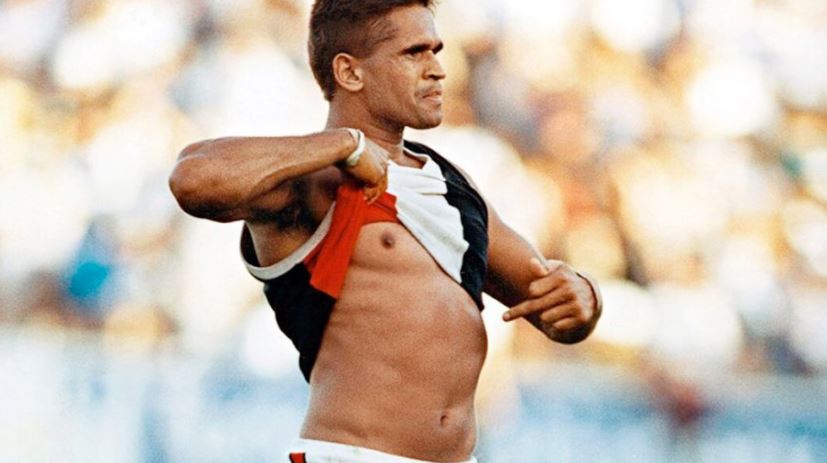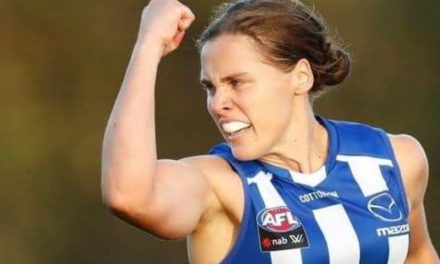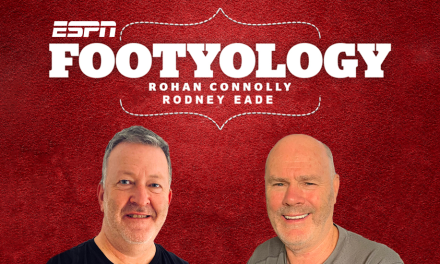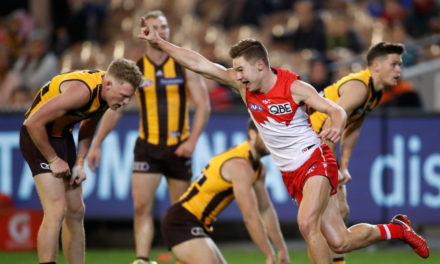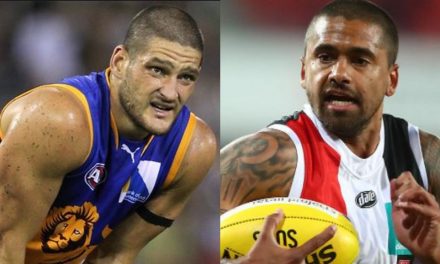Nicky Winmar takes a stand against racism in one of the most iconic moments in VFL/AFL history. Photo: WAYNE LUDBEY
AFL football has had some major flashpoints over the years both purely as a game and as a measuring stick of societal attitudes. Taylor Walker’s suspension for racial abuse might prove to be one of the most significant.
Not immediately, perhaps. Both because emotions are still running high, and that only time will offer a broader perspective of the historical context. But the level of anger and despair among the Indigenous community over Walker’s slur towards North Adelaide player Robbie Young is at a level I don’t remember previously. And rightly so.
It betrays complete exasperation at the failure not just of the Adelaide veteran, but of a still too-large chunk of the football world to “get it”. And if anyone connected with the AFL industry still doesn’t get it, when on earth will they?
League football has been at the forefront of discussion about racism for nearly 30 years now, since Nicky Winmar’s famous stand at Victoria Park in 1993.
AFL players receive education about the impact of racism to a degree far exceeding the public at large. Unlike much of that public, they all play alongside, against, and mix with Indigenous players and those of other races on a daily basis. Indigenous people comprise around three per cent of Australia’s population. Their representation in AFL is at about 11 per cent.
Walker played for six years alongside Eddie Betts, one of the most-loved players AFL football has seen. When Betts was racially abused by spectators during a “Showdown” against Port Adelaide, Crows captain Walker loudly condemned those “fans”, called his Port cohort Travis Boak and suggested a joint public stance.
How does anyone now see actions like those as anything other than the most cynical PR stunt? How must Betts have felt when he learned of what Walker had done at the quarter-time break of a SANFL game? And why would any Indigenous player, or one from another racial group, now feel anything other than complete scepticism about any subsequent apology from an offending party when racism occurs?
Walker’s video apology sitting alongside Young on Monday ticked all the right PR boxes, of course. It made sure it showed Walker first choking back tears before he began. It had Young sitting silently alongside Walker, offering support and a reassuring hand on Walker’s shoulder. But it didn’t seem to convince the people who mattered most.
Former Collingwood and West Coast Indigenous player Sharrod Wellingham contrasted Walker’s measured to-camera piece with the raw, unscripted emotion of Adelaide coach Matthew Nicks last week when the former Sydney player, who played alongside the likes of Adam Goodes and Michael O’Loughlin, was moved to tears as he spoke of the damage done.
Former player now media commentator Tony Armstrong focused on Walker’s comment to Young: “I’m going to lean on you, Robbie.”
“It’s always on Indigenous people, to always be taking the higher road and always having to extend the olive branch out and be the ones to help and to educate,” he said on ABC News Breakfast.
The scepticism is real, and right. When do we hear exactly what that “education” entails? And why is it given the same descriptor one might apply to studying for a trigonometry exam?
PLEASE HELP US CONTINUE TO THRIVE BY BECOMING AN OFFICIAL FOOTYOLOGY PATRON. JUST CLICK THIS LINK.
Hasn’t Walker spent enough time around Indigenous people and issues via his involvement in AFL to have been educated already? And if one’s use of a disgusting racial slur comes instinctively despite that, exactly what amount of “education” will change those attitudes?
What this episode has done, sadly, is reaffirm the concept of “other”. Nearly all of the instances of racism in AFL football for a long time now have involved spectator abuse of players, either directly or on social media.
That makes it so much easier for players like Walker to condemn, because the subjects of his criticism are outside his immediate sphere. The condemnation of such actions is always universal in the football community, the ramifications of delivering it minimal as the subjects are far removed from the immediate AFL bubble.
This time, the culprit is inside the tent, those most affected by the racism on show the same people with whom the man who delivered the words plays, trains, showers and socialises.
The message Walker inadvertently sent to them is that they, too, are “other”. That, sure, you don’t call them those things audibly to their faces. But to mutter the words out of their earshot, to think them, is OK.
For any Indigenous or minority race player, at whatever level, that is a depressing realisation indeed. Because for every Walker, there has to be scores of others, and they with the added insurance of knowing their words and thoughts are never likely to be revealed publicly, nor they shamed on national media outlets.
The AFL, in meting out sanctions, has to strike a balance between punishment and atonement. But it can’t be ignored that 22 years since former St Kilda star Peter Everitt was suspended for four games for racially abusing Melbourne’s Scott Chisholm, Walker’s penalty is only two more games.
Neither can the roll call of episodes in AFL football involving racism which continue to this day.
Episodes like the disgraceful treatment of a bona fide champion of the game in Goodes, and the league’s equally disgraceful failure to act swiftly and decisively to stamp it out. Like not only Heritier Lumumba’s treatment as a player at Collingwood, but his subsequent battle to be taken seriously on the issue and the active undermining of his credibility. Ditto former Gold Coast player Joel Wilkinson.
These are all moments which betray a game big on paying lip service to important principles, but doing bugger all to meaningfully impact on actions and attitudes. So why is this a flashpoint? Because Walker’s off-the-cuff remark might end up bringing the bullshit and spin to an end.
Like Peter Finch in the movie “Network”, you can feel football’s Indigenous peoples sick to death of the platitudes metaphorically bellowing: “I’m as mad as hell, and I’m not going to take this anymore!”
Neither should they. And, if we really are the decent, compassionate society we aspire to be, nor should any of us.
This article first appeared at ESPN.

